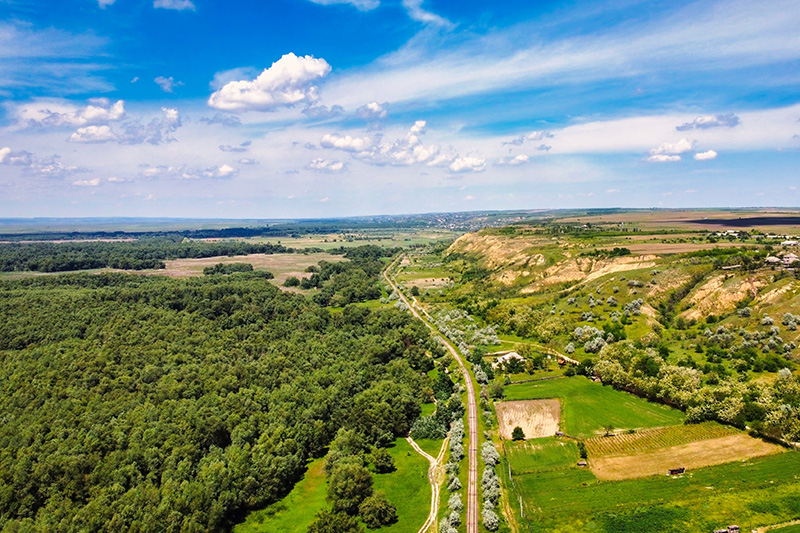
Forests play a crucial role in ensuring our health and the health of our planet. They clean the water, purify the air, protect the soil, and capture carbon to fight climate change. Forests nurture habitats for wildlife and plant diversity to ensure viable ecosystems, which underpin human, economic, and environmental well-being. On International Day of Forests, the world celebrates the achievements made so far in greening our landscapes and acknowledge work yet to be done.
The European Union recognizes the role of forests in building national wealth and the well-being of people and the environment. Within the EU-funded EU4Environment Programme, the World Bank-led components support the governments of the EU’s Eastern Partner countries to strengthen sustainable management of natural habitats, reduce biodiversity loss and land degradation, expand a shared network of protected areas, and promote community-led action in forest conservation.
In Moldova, like elsewhere, forests are part of the country’s natural capital, harboring 80% of the country’s biological diversity. The forests have also high economic importance. In fact, the value of ecosystem services provided by the country’s forests to the tourism, agriculture, water or other sectors is estimated at around $70 million annually. Yet, forests in Moldova are among the most endangered in Europe due to excessive exploitation, unauthorized logging, and inefficient forest management practices that are unable to impede human encroachment.
According to the Food and Agriculture Organization (FAO) of the United Nations, in 2020, Moldova’s forest cover was estimated at just under 12% of the country’s total area – significantly less than the global average of 31% and the EU average of 37.7%. High prices for fuelwood along with overgrazing and inefficient governance are significant impediments to a sustainable forest management.
Within the EU4Environment Programme, the World Bank has collaborated with the Ministry of Environment of Moldova in consultation with key stakeholders, to formulate recommendations that informed the newly developed National Forest Extension and Rehabilitation Program (NFERP) for 2023-2032, which was adopted on 17 February 2023. This was the new environment-focused policy document approved by Moldova’s government, underscoring the important role healthy forest ecosystems play on the country’s development agenda and affirming its green ambition.
The newly adopted NFERP aims to support the country’s needs in forest products and services and increase resilience to climate change in the long term through conservation and sustainable development of national forest resources. It will help protect Moldova’s water and soil resources, provide forest products, and boost ecosystem services.
Under the NFERP, over the next 10 years, Moldova’s forest cover is expected to reach at least 15% of the country’s territory. This will be achieved through the planting of new forests on 110 000 hectares and rehabilitation of existing forests on 35 000 hectares of state, communal- and privately owned land. Moreover, in addition to restoring landscapes, improving soil fertility, and protecting watersheds, these activities aim to provide nearly 14 000 jobs to rural communities.
Adopting this new program has given an impetus for international development partners to engage with the Ministry of Environment and civil society and potential donors of the much-needed financial assistance to ensure its effective implementation, which is estimated to cost nearly €759 million. The NFERP will play an important role as an umbrella program for various donor-funded projects that seek to support Moldova towards its sustainable development goals through greening the country’s landscapes.
The new program is also propelling Moldova towards meeting its commitments under the Association Agreement and a Deep and Comprehensive Free Trade Agreement (DCFTA) signed with the EU in 2014. The commitments include activating structural reforms and harmonizing the country’s legislation with the EU acquis communautaire. Under the terms of the EU Association Agreement, and now as an EU candidate country, Moldova has pledged to achieve certain environmental and economic indicators to ensure healthy forests in the long term.
In addition to international commitments and initiatives related to forests and land use, the NFERP will help Moldova align its goals of restoring its forests and sustainably managing its ecosystems with in line with the European Green Deal — EU’s strategy to achieve its climate targets, including reaching climate neutrality by 2050. The new EU forest strategy for 2030 is now part of the European Green Deal’s flagship initiatives. This strategy underscores the crucial role forests and forest-based value chains play in achieving sustainable and climate-neutral economy by 2050 while protecting and strengthening resilience of ecosystems.
With the successful implementation of the NFERP, Moldova stands to reap enormous benefits not only in ensuring sustainable forest ecosystems, but also in bolstering economic growth and securing livelihoods and well-being for its people while mitigating climate change for the world.





